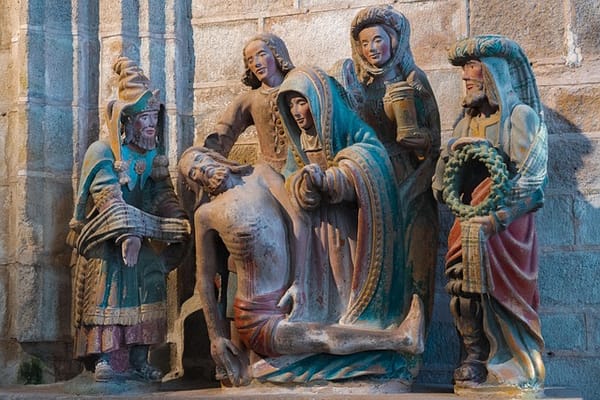When the Household Becomes a Battlefield
Finally, we must begin to create new sanctuaries: places where those who are exiled in their own homes can belong, grow, and heal.

Finally, we must begin to create new sanctuaries: places where those who are exiled in their own homes can belong, grow, and heal.


The image of the household as a safe haven, a place of belonging and nurture, is deeply woven into human culture. Yet behind closed doors, countless lives are lived in hidden servitude and silent torment. What appears outwardly as warmth and security can inwardly become a crucible of conflict, where the deepest injustices unfold under the guise of “care” and “love.”
Women know this most keenly. Even in the modern world, many are reduced to house-slaves: their dignity crushed beneath endless invisible labor, their personhood diminished by the unspoken expectation that they exist only to clean, serve, and hold the weight of others. Their inner lives are often disregarded; their needs erased; their voices dismissed. The “homemaker” becomes the one whose home leaves no space for her own becoming.
Children too bear this burden. From a young age, they can be forced into roles or identities they did not choose — sometimes even against the very grain of their souls. Parental “niceness” and societal affirmation often conceal coercion: the molding of the child’s life according to unconscious fears, ideologies, or ancestral patterns. What is praised as guidance may in fact be a subtle imprisonment.
The injustice is not always intentional. More often it arises from a deeper clash within humanity itself. For in our time, two streams of existence meet — and often collide — within the same household.
In earlier epochs, human beings lived more within group-soul identity. One’s place in life was given by bloodline, tribe, or tradition. The family defined who one was; individuality was not yet the axis of human life.
Today a new current presses forward: the force of individuation. The “I” seeks its own path, not defined by inherited expectations. This is the Christ-impulse in its deepest sense: the call for each person to discover themselves as a free being, capable of standing before the world in their own name.
Within the family, these two forces inevitably clash. Some members remain bound — often unconsciously — to the group-soul, to ancestral obedience, to collective molds. Others awaken to individuation, seeking to step free from those bonds. The result is often not harmony, but conflict. Parents can become the unconscious torturers of their children; children can become the silent rebels of their parents. The very ones who are supposed to love each other most deeply become each other’s adversaries.
This drama was already spoken in the Gospels. In Matthew 10, Christ utters words that have often been misunderstood:
“Do not think that I came to bring peace on earth; I did not come to bring peace, but a sword. For I have come to set a man against his father, a daughter against her mother, a daughter-in-law against her mother-in-law. A man’s enemies will be those of his own household.”
These are not words of destruction for destruction’s sake. They are the truth of emancipation. Christ names the inevitability that the birth of the true “I” will divide. It must divide, because the old bonds cannot hold what is being born. The sword is the line that severs the group-soul from the free individuality.
This is why households so often conceal terrible dramas. What looks like rebellion, estrangement, or “confusion” is often the battle of individuation against the prison of inherited forms. What looks like peace and harmony is sometimes only the silence of suppression.<
Many souls today — young and old alike — find themselves exiled within their own homes. They are not understood, not met in their becoming. They carry futures that their families cannot yet recognize.
Without sanctuary, they suffer in silence. Some collapse into illness or despair. Others are pressed into roles that distort their essence. They live on the threshold, half-formed, neither belonging to the old nor fully able to step into the new.
This is perhaps one of the deepest sufferings of our time: the household itself becoming the battlefield of the soul, the place where the sword falls most sharply.
What recourse is there?
The first step is recognition. We must name invisible labor as real, and treat it with dignity. We must see the hidden servitude of women not as “natural,” but as injustice. We must recognize children as independent beings, not extensions of parental desire.
The second step is acceptance of Christ’s sword. The divisions that appear in families are not accidents, but signs of the larger individuation process. They are painful, but they carry the seed of freedom.
Finally, we must begin to create new sanctuaries: places where those who are exiled in their own homes can belong, grow, and heal. These may be small circles, communities, or simply gestures of recognition — but they are essential. For individuation cannot be accomplished alone; it needs witnesses, allies, and spaces of shelter.
The paradox is this: what looks like division is in truth a gateway. Christ’s sword wounds, but it wounds in order to heal. It cuts the soul free from its chains, so that love may be reborn in freedom rather than obedience.
Those who suffer this exile are not lost. They are the pioneers of a new humanity. Their wounds are the cracks through which future light can enter.
The battlefield of the household is not the end. It is the beginning of a new kind of belonging — one grounded not in blood, not in coercion, but in the freedom of the spirit.








